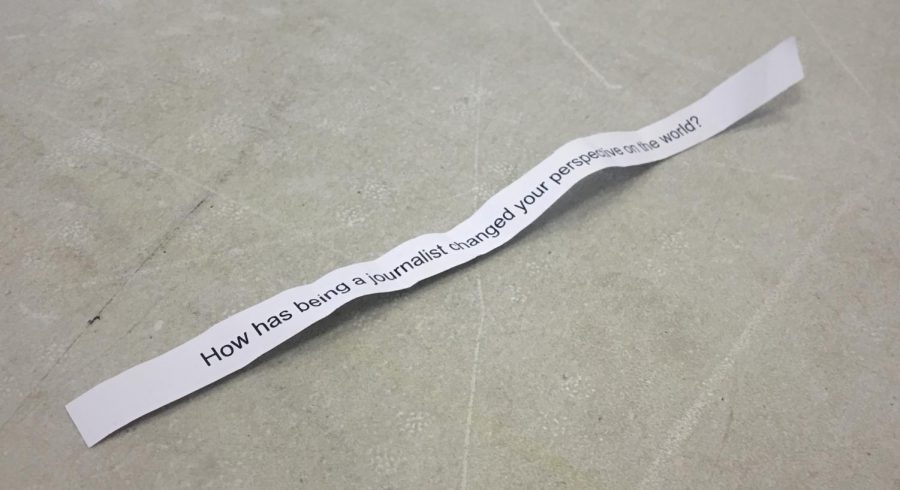A journalist, an audience of freshmen and a conference
One of the slips given to the many students at the conference that reads: “How has being a journalist changed your perspective on the world?”
During fifth period on April 29, the Global Scholars Program English 9 class, taught by Gina Vattuone, and Geography 9, taught by Kelly Leon, gathered in Bonita Vista High School’s cafeteria. At this conference, students conversed with Boston Globe Journalist Nestor Ramos through video chat.
This first conference came to be after Vattuone showed her class one of Ramos’s pieces titled “On the Orange Line tracks, three discarded items and the stories they tell.” When reading this piece in class, Vauttone advised students to write a piece just like Nestor with the beginning being 3 miscellaneous objects. For Nestor, it was, “A pacifier. A whiskey bottle. A needle.” Starting with the same introduction, students wrote their pieces about global issues.
Vattuone sent the student articles to Nestor. As a result, Nestor reached out, interested in hearing from the students themselves.
When the conference began, students lined up behind the laptop to ask Ramos questions. A few asked about how he structured his first paragraph as a punctuated list of three different objects. In response, Ramos answered that he tries to vary his ledes, but usually makes them concrete in order to get the writing process started.
Claproth explained that after reading Ramos’s column, he and his classmates agreed that they had all experienced or witnessed some sort of addiction in their life. The three objects symbolized drug use during pregnancy. Ramos found these objects on a train track and used them as inspiration for his column.
“His answers made me feel more connected to him and to other people just like me, because we’re all going through the same thing,” Claproth said.
Another student fond of Ramos’s work, freshman Eliza Schultz, asked how long his writing process takes. Ramos answered that he’s capable of having flexible hours though some pieces may have strict deadlines to them. With children, Ramos finds it difficult to come home in time to be with his family when having to work late hours. Schultz asked follow-up questions regarding the specifics of his schedule.
“[The students] came up with all those questions themselves. I wrote down the questions [on strips of paper] and distributed them,” Vattuone said. “I was especially proud when [the students] asked follow-up questions that were pre-scripted. To know they’re just in ninth grade, they really were letting their voices be heard.”
After a few students had their share of questions, Schultz made her way to the screen once more. “It’s me again,” she began.
Schultz then asked if it’s ever difficult for Ramos to find reliable sources. Ramos explained with some tougher pieces, such as his current project on climate change, that have with a short or long time frame, sources depend. He explains that on tighter deadlines, he searches on social media to get different viewpoints. With pieces that are more in-depth, Ramos takes his time with sources to find the most credible.
Schultz used to write a lot in her free time, though as time progressed she began widening her horizons to different hobbies. She expressed how from this conference that she will take into account Ramos’s several points and advice about writing. She states that the conference inspired her to begin writing again.
Claproth asked why Ramos chooses to write his pieces in story-like format. Ramos explained that as a columnist, he writes through his personal perspective about certain experiences and uses storytelling to emphasize a his message.
Vattuone wanted her students to gain knowledge on how to gain a voice through writing.
“I hope [the students] get inspired to see that there’s a real person behind it all,” Vattuone said. ”I hope students think about some interesting things to say about writing, to think about writing as a tool to give voice to people who are often ignored.”

My name is Kara Barragan and this is my fourth and final year with the Crusader. As a freshman I was on the lookout for an outlet where I could put out...

